Durham Bat Removal
Welcome to Durham Bat Removal! We are North Carolina bat removal specialists. It is important to know that bats are protected by North Carolina law, and are beneficial animals to have in the environment. We do not kill any bats during our bat removal process. Never hire a pest control company or anyone who says they are a Durham bat exterminator. For correct and effective bat removal, you want a company that specializes in humane bat colony extraction. Our process is not only the only legal method in North Carolina, but it is the most effective. We have a 100% success rate in our bat control process. We perform our industry-best 32-point inspection of your house or building, and seal shut all bat entry holes down to 1/4 inch as part of the removal process, during which we remove the colony via special one-way exclusion devices specific to your architecture. Once all bats are safely out, we permanenetly bat-proof the structure. We also provide guano (bat droppings) removal and decon. Click on our Durham Bat Control Prices page to find out more about our prices for bat control work. We work 24/7/365, and would love to talk to you about your bat problem. Call us any time at 919-251-5522 to discuss it, discuss our pricing, and if you wish, set up an appointment at your convenience, often same-day.
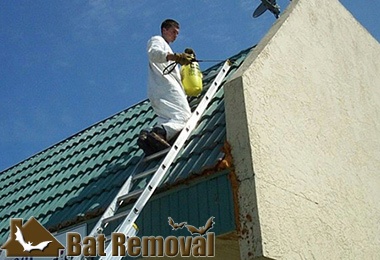
Durham Building and Attic Inspections
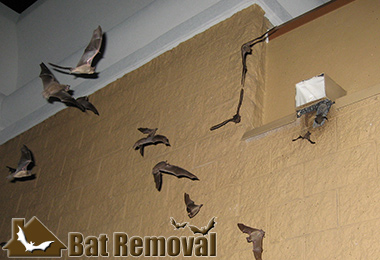
No-kill North Carolina Bat Extraction
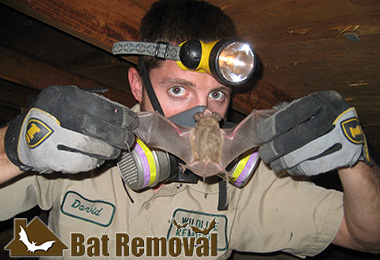
Guano Cleanouts - Serving all of North Carolina
Call 24/7 to discuss your bat problem.
Same-day or next-day appointments.
32-point inspection of your property.
Written estimates for bat removal project.
Fully state licensed and insured.
Residential and commercial service
100% no-kill Durham bat extraction
Complete bat-proofing of your building
Compliance with all North Carolina, federal laws
Guano removal and attic decontamination
Our Service Range - 919-251-5522
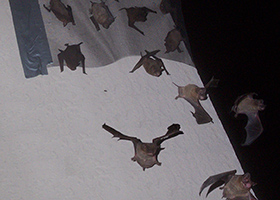
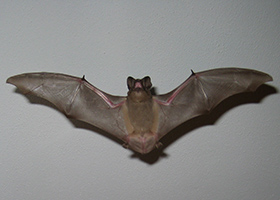
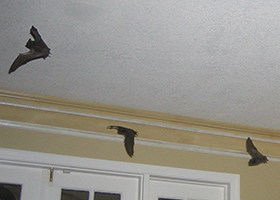
4 Things You Need to Know about Histoplasmosis
Histoplasmosis is a disease that can be contracted by breathing the fugal spores that are found in the droppings of the birds and bats. Once the droppings have been disturbed (for instance while sweeping), the fungal spores are very light that it can be carried through the air. The disease can also be transmitted if you are in direct contact with a contaminated soil. Landscapers, farmers, or any person in contact with the soil are at risk of this disease.
What You Should Know About Histoplasmosis
Usually people who are infected with this disease will never develop any symptoms. You may also not be aware that you are a carrier of the disease. However, for people with a weakened immune system, the disease can be severe and may show alarming symptoms.
1. Symptoms of Histoplasmosis
Histoplasmosis will have different symptoms. If the disease is mild, it will not develop any type of symptoms and the disease will pass just like a common fever. Symptoms will usually manifest 17 days after you have been exposed to the fungal spores known as Histoplasma Capsulatum. Some of the symptoms will include chest discomfort, dry cough, fever, muscle pain, chills, and headaches. There are some cases when the disease will develop rashes. People who have a respiratory ailment can develop emphysema. During serious cases, the disease can affect the nervous system and may lead to organ failure.
2. Diagnosis of the Disease
A person that is supposedly infected with histoplasmosis will have to go through a chest x-ray. If the disease is acute, the result may show a diffused or normal modular. There should be lesions in the cavity of patients with pulmonary histoplasmosis. Some doctors will also perform tissue biopsy. This is necessary to understand the histology of the specimen.
3. Treatment of Histoplasmosis
Usually, this disease will simply pass without any form of treatment. Nonetheless, the doctor may still prescribe antifungal medicines that aims to cure the severe form of Histoplasmosis with chronic and pulmonary infections. One of the most common medications would be Itraconazole. Contingent upon the severity of the disease, treatment may range from 3-12 months.
4. Cause of the Disease
The histoplasmosis is caused by Histoplasma Capsulatum. The spores will be airborne once the material that is contaminated with the fungus has been disturbed. Those who have a history of being infected with the disease can still contract the disease. Nonetheless, the symptoms will be a lot milder compared to the first infection. The fungal spores can survive in the nutrient-filled fecal matters of birds and bats and on the soil. Therefore, the pathogens can often be found on barns, chicken coops, and caves.
Exposure to the fungal spores can be prevented by being careful on the place where you will commonly see the birds and bats. All contaminated areas will need to be sanitized to eliminate the fungal spores. Before you disturb the bat guanos, you should directly spray it with water to prevent the disease from being carried through the air.

